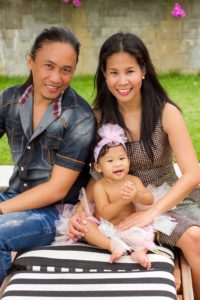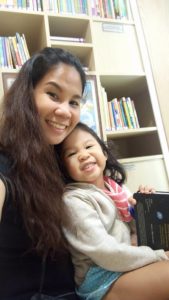This week I talk to Francine who is Filipino and has 2 children, 1 of which, was born in Thailand as part of the series The Global Differences of Baby-Making. Here is her story:
Tell me a bit about yourself? Where are you from? How old are your children and where did you have them?
 My name is Francine. I am from the Philippines. I came to Thailand in December 2004 – when my first child was just 10 months old – upon invitation from my aunt who is an international school teacher in Bangkok. I just graduated from college at the time and was trying to find a job back home. My aunt suggested to try my luck in Bangkok, but to come as a tourist first. If I thought it would be okay to have a job there, then I can make the decision to stay later on. I fell in love with Thailand ever since then. I have two daughters — the first is now 13, and the younger one is 3. My first child is with my mom back home, who she grew up with. And my second was born and and being raised in Bangkok.
My name is Francine. I am from the Philippines. I came to Thailand in December 2004 – when my first child was just 10 months old – upon invitation from my aunt who is an international school teacher in Bangkok. I just graduated from college at the time and was trying to find a job back home. My aunt suggested to try my luck in Bangkok, but to come as a tourist first. If I thought it would be okay to have a job there, then I can make the decision to stay later on. I fell in love with Thailand ever since then. I have two daughters — the first is now 13, and the younger one is 3. My first child is with my mom back home, who she grew up with. And my second was born and and being raised in Bangkok.
Why did you have your daughter abroad?
I think, I didn’t really have any reason, or choice, for having my second one in Bangkok. It’s just that she came at a time when my partner and I decided that it’s actually time to have a second, and we were both in Bangkok.
What do you feel were the benefits to having children abroad?
 First and foremost is, that we are able to be hands-on in raising her. With my first one, I didn’t really get to have a lot of opportunities to be a parent to her. My mom filled in that role. We get to see each other on Yahoo Messenger, and then Skype when that technology came, but I didn’t get to have a first-hand experience of actually raising her. Also, raising a kid abroad means I have the chance to be multilingual to her — I speak my dialect, Tagalog, English, and Thai. When you have a kid back home, there is that complacency of not having to speak any other languages to him/her even if you do know some other languages. But here, I already foresee that she needs to be able to speak Thai in the future, so I start early with that. And she needs to be able to communicate in English when she goes to school later on. Also, since having my kid in Bangkok, I found out that processing government-related documents here are faster and more efficient. For example, securing a birth certificate for her. Even though it required three parts – translation, authentication at the Thai Ministry of Foreign Affairs, and actual processing at the Philippine Embassy – it took me half the time if it was processed back home with a regular birth certificate.
First and foremost is, that we are able to be hands-on in raising her. With my first one, I didn’t really get to have a lot of opportunities to be a parent to her. My mom filled in that role. We get to see each other on Yahoo Messenger, and then Skype when that technology came, but I didn’t get to have a first-hand experience of actually raising her. Also, raising a kid abroad means I have the chance to be multilingual to her — I speak my dialect, Tagalog, English, and Thai. When you have a kid back home, there is that complacency of not having to speak any other languages to him/her even if you do know some other languages. But here, I already foresee that she needs to be able to speak Thai in the future, so I start early with that. And she needs to be able to communicate in English when she goes to school later on. Also, since having my kid in Bangkok, I found out that processing government-related documents here are faster and more efficient. For example, securing a birth certificate for her. Even though it required three parts – translation, authentication at the Thai Ministry of Foreign Affairs, and actual processing at the Philippine Embassy – it took me half the time if it was processed back home with a regular birth certificate.
As an expectant mother abroad how did you feel?
At first, I was apprehensive. Not with the language barrier, but with the whole having a kid again after 10 years! Filipinos are very superstitious. There are a lot of traditions that you need to go through during pregnancy and childbirth, and I forgot all of them! When our Filipino nanny came, she was the one who was leading us through all of them. But of course, I could have been more confident if my mom, who was a nurse, was by my side. It was a time when there was a barrage of scare news going on that I wasn’t sure which one to believe anymore. So if there was anything I read about or something that I don’t feel right about, I would call or text her and ask for her more medically-based advice.
Did you encounter any opinions that would have been different in your home country with regards to your pregnancy or parenting choices?
 Oh, a lot! Here, I found out that after giving birth, a mother can take a shower. Imagine my nanny’s horror when I told her that the nurse is preparing me for a shower! You see, Filipino women after they give birth, they are not allowed to take a shower — only a rub-down with a warm (emphasis on not cold), moist towel. We have the belief that childbirth is tasking on a woman’s body, that I can agree to, and the nerves will be damaged if you take a shower after. She will end up frazzled for life. Also, back home, women take it easy after childbirth — not a lot of walking around and doing heavy lifting. My nanny and my partner gave the nurse a massive side-eye when she asked me to get up from the bed and walk around, not 24 hours after I gave birth. And here, we are not supposed to buy baby clothes and items before childbirth as that is bad for the child, according to Thai superstition. But back home, having a child means one whole day of shopping spree for the baby’s clothes and stuff. When we came to the hospital on the afternoon that I gave birth, we had 1 big suitcase for the baby’s clothes and a small overnight bag for the mother.
Oh, a lot! Here, I found out that after giving birth, a mother can take a shower. Imagine my nanny’s horror when I told her that the nurse is preparing me for a shower! You see, Filipino women after they give birth, they are not allowed to take a shower — only a rub-down with a warm (emphasis on not cold), moist towel. We have the belief that childbirth is tasking on a woman’s body, that I can agree to, and the nerves will be damaged if you take a shower after. She will end up frazzled for life. Also, back home, women take it easy after childbirth — not a lot of walking around and doing heavy lifting. My nanny and my partner gave the nurse a massive side-eye when she asked me to get up from the bed and walk around, not 24 hours after I gave birth. And here, we are not supposed to buy baby clothes and items before childbirth as that is bad for the child, according to Thai superstition. But back home, having a child means one whole day of shopping spree for the baby’s clothes and stuff. When we came to the hospital on the afternoon that I gave birth, we had 1 big suitcase for the baby’s clothes and a small overnight bag for the mother.
What advice would you give other mothers in your situation?
 For them to do a lot of research. Giving birth and having kids abroad have certain nuances that you need to be aware of. Do you want home birth? A doula? Do you need an English- only facility? How much can your budget afford? What birth packages are available to you? You need to read up on them and find out as much information as you can. There are sites like thailandstartertkit.com that are excellent resources for expats. Also, you need to find a hospital and OB-GYNE doctor that you trust. Your OB, your husband, and you need to be a team when it comes to the birthing plan. You can’t have someone on your team that is not on the same page as you. And there is nothing wrong in over-preparation. You can even overdo it. And if you can, stay off of social media and questionable health news site. All the scaremongering is hindering you from enjoying this wonderful experience that lasts for only 9 months in your life.
For them to do a lot of research. Giving birth and having kids abroad have certain nuances that you need to be aware of. Do you want home birth? A doula? Do you need an English- only facility? How much can your budget afford? What birth packages are available to you? You need to read up on them and find out as much information as you can. There are sites like thailandstartertkit.com that are excellent resources for expats. Also, you need to find a hospital and OB-GYNE doctor that you trust. Your OB, your husband, and you need to be a team when it comes to the birthing plan. You can’t have someone on your team that is not on the same page as you. And there is nothing wrong in over-preparation. You can even overdo it. And if you can, stay off of social media and questionable health news site. All the scaremongering is hindering you from enjoying this wonderful experience that lasts for only 9 months in your life.
****
About Francine:
Francine is an aspiring maternity, newborn and family Photographer in Thailand – you can connect with her on Facebook.
Want to share your story? Get in touch: ameena@mummyinprovence.com
